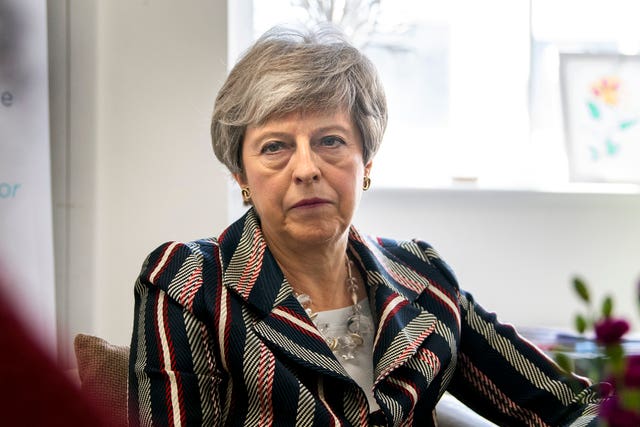Cabinet agrees to continue Brexit talks with Labour despite Tory concerns
Ministers will continue to seek an agreement with Jeremy Corbyn’s party but will attempt to get a deal through Parliament by the summer.

Cross-party talks between the Government and Labour will continue despite Tory opposition to Jeremy Corbyn’s key demand.
After a marathon Cabinet meeting ministers agreed to continue the cross-party efforts but stressed it was “imperative” for a Brexit deal to get through Parliament by the summer recess.
With Theresa May’s future linked to the passage of a Brexit deal, getting legislation through the Commons and Lords by the summer break could also pave the way for her departure from Number 10.
The Prime Minister and Labour leader will meet in Parliament to discuss the Brexit talks on Tuesday evening.

Ministers spent more than two hours discussing the Brexit situation and despite the apparent lack of progress in talks with Labour decided the process should continue, but with a clear view that “we need to get a move on”.
The Prime Minister’s official spokesman said: “Ministers involved in the negotiations set out details of the compromises which the Government was prepared to consider in order to secure an agreement which would allow the UK to leave the EU with a deal as soon as possible.
“Cabinet agreed to continue discussions with Labour to see what was possible.
“However, it was agreed that it was imperative to bring forward the Withdrawal Agreement Bill in time for it to receive royal assent by the summer parliamentary recess.”
No date has been set for the summer recess, but Parliament usually rises near the end of July.
Asked if getting the deal through would also make that Mrs May’s exit date, the spokesman said: “What she wants to do is get a deal through by the summer recess.
“She has at the same time said she would step aside once she has completed phase one. But the conversation at Cabinet wasn’t about that.”
Mrs May and her effective deputy David Lidington – who has been leading the negotiations with Labour – led the Cabinet discussions, but other ministers involved in the talks contributed.
The conversations with Labour had been “difficult”, the spokesman said, but ministers were “determined to find a way through” the Brexit impasse.
Asked if there was Cabinet unity, the spokesman said there was a “very clear determination to find a way to resolve this”.
Ministers had a “very clear understanding that the British public want the Government to get on with delivering this”.
A Cabinet source said Mrs May stressed the need for compromise and said the Government could not give in to “absolutism”.
Allies of the Prime Minister attempted to calm Tory fears about the prospect of a damaging split in the party over a customs union – Labour’s key demand in the talks.
The Prime Minister was warned by senior Conservatives that she risks losing the “loyal middle” of the Tory party if she gives ground on the issue.
Number 10 sources insisted the Government would not sign up to a “permanent” customs union and any compromise position may only be an “interim” measure.
Some 13 former ministers, together with the chairman of the backbench 1922 Committee, Sir Graham Brady, have written to the Prime Minister urging her not to concede Labour’s key demand.
The signatories include Gavin Williamson, who she sacked as defence secretary, as well as potential leadership contenders Boris Johnson and Dominic Raab.
The letter, organised by Greg Hands, said Mrs May could not bind her successor to a deal so any agreement with Labour was likely to be “at best temporary, at worst illusory”.
“We believe that a customs union-based deal with Labour will very likely lose the support of Conservative MPs, like us, who backed the Withdrawal Agreement in March (in many cases very reluctantly), and you be unlikely to gain as many Labour MPs to compensate,” they said.
A Number 10 source said: “We will not sign up to a permanent customs union.
“We are trying to find a compromise on customs as interim position or stepping stone.”
The source stressed that both sides in the cross-party talks agreed that no Parliament can bind a future government and pointed out that most EU trade deals have a six to 12 month exit clause.
Shadow chancellor John McDonnell – who said both he and Jeremy Corbyn were Remainers at heart – claimed there had been no “significant shift” from the Government.
He said: “We have been at this five weeks, we haven’t seen the significant shift yet that we require to be able to support a deal.
“And, let’s be absolutely straight, today hasn’t helped.”
Referring to the prospect of a new Tory leader tearing up any agreement, he added: “Our big problem now is, if we are going to march our troops in Parliament to the top of the hill to vote for a deal and then that’s overturned within weeks, I think that would be a cataclysmic act of bad faith.”
He said the Tories “may well have to concede that there is a public vote of some sort” on the deal.
Meanwhile, Mrs May’s chief negotiator Olly Robbins was in Brussels for two days of talks about the possibility of making changes to the Political Declaration – the document setting out the framework for the future UK-EU relationship after Brexit.
But Brussels officials insisted there were no negotiations and the EU was still on a “Brexit break”.
“We will come out of the Brexit break if there is something happening in London,” European Commission spokesman Margaritis Schinas said.





